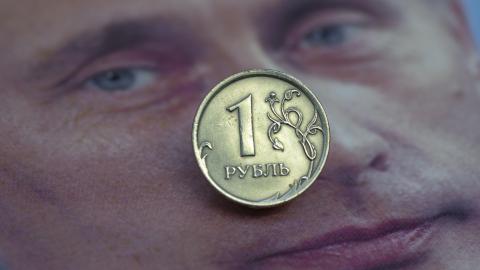For months President Donald Trump has been attempting to stop the fighting in Ukraine, and he may meet with Vladimir Putin in the coming days to discuss the war’s end. While the White House prepares for this summit, policymakers should understand how sanctions can help them achieve peace. In addition to providing Ukraine with the weapons it needs, the United States and its allies can force Vladimir Putin to end the war by removing his ability to pay for it.
A recent piece by Hudson Institute’s Thomas Duesterberg explains why ramping up Western sanctions on Russia’s war economy now could prove devastating. The Kremlin has not only covered up growing structural risks and massive inflation with bogus statistics, but it also has no options for further borrowing. Consequently, Moscow depends heavily on revenue from oil and gas exports, even as Western sanctions and deteriorating global market conditions threaten this vital source of income.
President Trump therefore has an extraordinary opportunity. By working with the European Union and other Western partners, the administration can throttle Russia’s ability to finance the war and force Putin to recalculate his ambitions. Below are six steps to achieve this goal.
1. Neutralize Russia’s Shadow Fleet
Russia relies heavily on a so-called shadow fleet of falsely registered tankers to export oil to third countries, where it is refined and often surreptitiously rebranded for sale in the EU and elsewhere.
Surprisingly, the United States lags behind the European Union and United Kingdom in designating tankers involved in this form of sanctions evasion. In particular, the US has targeted just 216 ships, whereas the EU has targeted 444 and the UK has targeted 423. Washington’s failure to align its efforts with Europe and Britain has left open a significant enforcement loophole for Russia’s shadow fleet. Closing this is perhaps the most significant and immediate action the Trump administration could take to disrupt Russia’s oil revenues.
The Trump administration should also increase political pressure on so-called false flag jurisdictions that register such vessels without any oversight of their ownership or activities. In the longer term, this could complicate Russia’s efforts to add new unsanctioned ships to its shadow fleet.
2. Punish Refiners and Their Bankers in China, India, and Turkey
China is by far the largest importer of Russian oil. The Trump administration has already sanctioned several “teapot refineries” processing Iranian oil in China, and it should now do the same for Russian oil. But to truly raise the costs and risks involved, the White House should escalate sanctions beyond the facilities themselves and target the financial institutions that back them. Chinese banks are already wary of US sanctions and would likely prove responsive to even the threat of such moves.
India and Turkey, meanwhile, serve as major hubs for the import and transshipment of Russian oil to the EU and elsewhere. But both are critical economic and security partners of the United States, setting up a strategic dilemma for the Trump administration.
In India’s case, President Trump has responded by imposing a 50 percent tariff on imports from the country. Yet tariffs are generally an inappropriate tool for achieving national security objectives. This measure does not punish Russia directly, but it has severely agitated New Delhi, potentially undermining years of progress on trade talks and defense cooperation.
Targeted secondary sanctions on Indian and Turkish refiners of Russian oil, as well as their financial backers, would be a more effective path forward.
3. Crack Down on Export Controls
Preventing the export and re-export of technology, goods, and commodities that Moscow could use to boost its defense production has been a priority since the full-scale invasion began. But the task has proven complicated and resource intensive as Russia and its partners become increasingly adept at circumventing such restrictions.
Analyses of captured Russian weapons and equipment reveal that a significant proportion of their components still come from Western companies, even if they are manufactured in China.
In addition to targeting resellers of weapons and dual-use goods in third countries with sanctions, the Trump administration needs to ramp up enforcement efforts against Western companies that—wittingly or unwittingly—fail to meet their due diligence obligations. The administration should also lead international efforts to establish reliable real-time customs data sharing between trusted partners, which would help track the movement of restricted goods across borders.
4. Improve Maintenance Sanctions
Russia and its facilitators continually reconstitute the networks of legal entities and front companies that enable sanctions evasion. Consequently, US sanctions officials are engaged in a game of whack-a-mole as they strive to identify and designate an ever-shifting cast of shady characters and obscure shell companies.
The Trump administration has not issued any new maintenance sanctions since January, effectively allowing these networks to operate and expand unimpeded. This may be resource-intensive work, but it is essential for disrupting the flow of restricted goods and funds into Russia’s war machine.
5. Seize Russia’s Sovereign Assets
G7 countries and the European Union have collectively frozen more than $330 billion in Russian sovereign assets, most of which by far are being held in Europe. Seizing these funds is an obvious—and morally justified—move that can help fund Ukraine’s assistance and reconstruction. However, some EU countries fear that legal obstacles and market reactions to such a move could generate unintended economic consequences.
While such concerns have merit, returning these funds to Russia is unconscionable given the immense scale of destruction Moscow’s unprovoked aggression has caused. The US should pressure its European allies to continue working to mitigate any adverse effects while ensuring they can seize and transfer the funds as soon as possible.
6. Topple Putin’s Puppets in Georgia and Africa
The Republic of Georgia occupies a strategic location just south of Russia on the Black Sea, and its eastern neighbor, Azerbaijan, has adopted an increasingly anti-Russian stance. Together, these two countries block Russia’s land route to Turkey and Iran, and they host important oil and gas pipelines that circumvent Russia and Iran to supply Europe.
Putin understands Georgia’s strategic significance, and in addition to his Soviet revanchist fantasies, this geography explains why Russian forces have occupied one-fifth of Georgia’s territory since a brutal invasion in 2008. Meanwhile, a pro-Russian oligarch controls the current ruling party in Tbilisi, Georgian Dream, which has used election fraud and repressive tactics to try to drag the country back under the Kremlin’s control. This prospect is not popular among Georgia’s pro-European population, and continuous mass protests have occurred across the country since October 2024.
Unsurprisingly, Georgia has also become a significant sanctions evasion hub since 2022, both for commercial goods (notably automobiles) and those with potential military applications. The country therefore helps keep Russia’s war economy going.
Congress stands ready to pass the bipartisan Mobilizing and Enhancing Georgia’s Options for Building Accountability, Resilience, and Independence (MEGOBARI) Act, which would impose crippling sanctions on Georgian Dream officials, prepare a pathway for Georgia’s Western integration, and facilitate US trade and investment in the country. This legislation would cause Putin to lose political influence in Georgia, and he would then face severe distractions and a prestige blow while Russian forces remain bogged down in Ukraine. So the White House should urge Congress to pass MEGOBARI and put its authorities to work quickly.
Revenues from Africa have also helped Moscow fund its invasion of Ukraine. Russia’s proxy military companies, as successors to the disbanded Wagner Group, have established a significant political and military footprint in north and central Africa. Typically, these groups provide security assistance to embattled authoritarian regimes in return for access to natural resources. Squeezing their illicit networks through sanctions or even targeted military strikes would disrupt the flow of resources and revenue to Russia, as well as undermine its perceived value as a security partner.
Sanctions Are No Substitute for Weapons
Foreign policy experts have been vigorously debating the efficacy of sanctions on Russia since before the 2022 invasion, and these arguments have grown as the war drags on despite expansive financial and trade restrictions. But while sanctions should be part of any responsible US strategy toward Russia, they cannot be a strategy in and of themselves.
The Biden administration’s great strategic error in Ukraine was to trumpet the expansion of sanctions while refusing to provide Kyiv with the military equipment and training it needed to capitalize on unexpected early battlefield successes. President Trump can avoid the same mistake by crippling Putin’s war economy with the measures above while also giving Ukrainian warriors the weapons they need to defend their homeland and send the Russian invaders reeling.


















